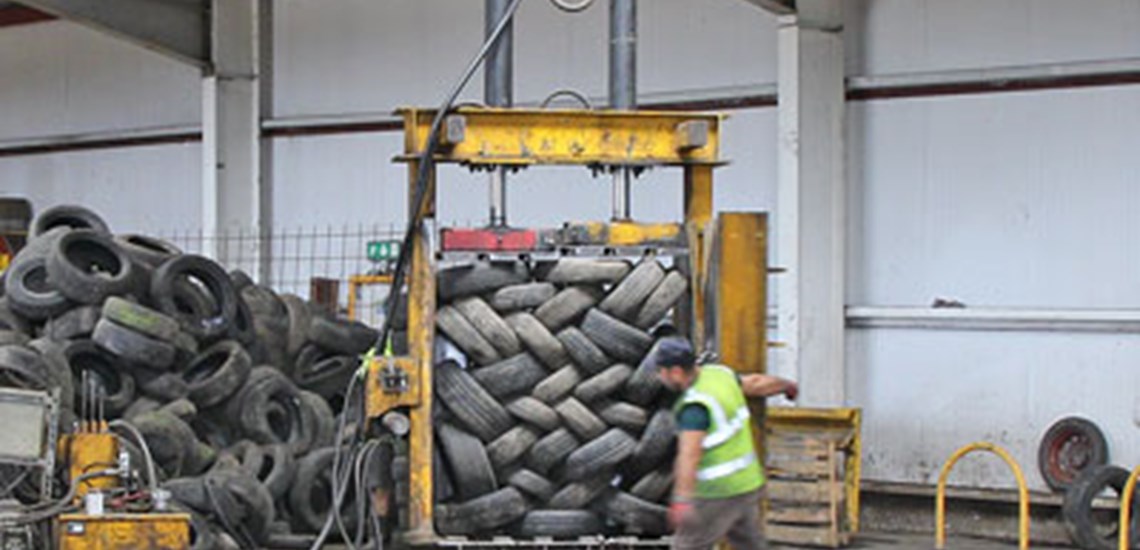As Indian agencies look at pollution, they claim the cause is European waste exports
European nations are leading contributors to the pollution, environmental damage and safety concerns caused by large scale export of end-of-life tyres (ELTs), according to the Indian tyre trade body the Automotive Tyre Manufacturers’ Association (ATMA). Figures show there was a surge of waste tyre imports from developed countries to India last year, leaving the nation facing significant environmental challenges.
In fact, figures seen by Tyre and Rubber Recycling suggest that India imported 1.3 million tons of waste tyres in 2023-24.
The Chairman of India’s Automotive Tyre Manufacturers’ Association (ATMA), Anshuman Singhania, raised concerns over the staggering statistic that India imported around 800,000 tonnes of scrapped tyres between April and November 2023. The UK was identified as one of the leading exporters of ELTs to India.
UK figures reveal some 300,000 tonnes of end-of-life tyre are exported from the UK per annum, yet the UK has at least 150,000 tonnes of licenced idle domestic recycling capacity of its own, possibly as high as 250,000 tons of spare capacity. It is claimed that 10-15% of India’s imported ELTs are sold as replacement tyres, with the rest go to outdated highly polluting batch-pyrolysis.
In a December 2023 report issued by India’s Central Pollution Control Board (CPCB) proposed a colour system of categorisation in order to advance compliance and promote the upgrade to new technology. The pyrolysis sector was categorised as orange, one down from the most polluting red. The colour categorisation system is seen as a significant step towards improving the licenced plants and clamping down on the most toxic pyrolysis practices, illegal small scale backstreet pyrolysis plants where many of the UK’s ELTs are believed to end up.
The TRA (Tyre Recovery Association) has welcomed the move from the ATMA to join forces with the CPCB and the Ministry of Environment, Forest and Climate Change to recognise the gravity of the situation and join force to implement these new regulations and tackle the significant environmental concerns from the disposal of whole end-of-life tyres which are exported in bales.
Peter Taylor OBE, Secretary General of the TRA, said; “This confirms our long-held suspicions and what many operators have been saying for a long time. While we are grateful to India’s Automobile Tyre Manufactures Association, people should be shocked at how their findings lay bare the inadequacy of UK government’s response to TRA demands for tighter export controls.
“Now the Chair of the ATMA, Mr Anshuman Singhania, is also calling for tyres to be size reduced prior to import to India (in UK terms shredded) to prevent their abuse by an onward market, perhaps the UK government can finally act to update the out of date and failing UK regulatory framework.
“The British government should also listen to Prashanth Doreswamy, President and CEO, Continental Tyres India, who has called for new regulations to be enacted in India to curtail the imports of waste tyres and allow only shred. There is no reason for the UK authorities to continue to dither, they should ensure we only export shredded tyres, grow our own circular environmentally responsible market and follow the very successful Australian example.
“ATMA has exposed the low standards of environmental practices which appear in some parts of their domestic industry. The evidence from them is clear, too many operators in the Indian onward market are not meeting the recognised environmental standards or their equivalence. It is time the UK government woke up and acknowledged that far from tackling this environmental assault they are enabling UK operators to facilitate environmental harm.
“It is time UK government does the right thing and help India stop these environmental abuses, as India’s manufacturers demand of us.”
Of course, the export of tyres to illegal operations – anywhere – is a breach of The Basel Convention. As is the failure to obtain Annex VII certification. The UK government has, in its hands, the tools to deal with this using existing rules. That it does not, is an indictment of its efficacy.
The export of waste tyres could be controlled by implementing the existing rules. There is a lack of interest or will on the part of DeFRA to call for the action required. In the meantime, UK domestic recycling suffers by being undermined by cheap and quick exports to India.


















